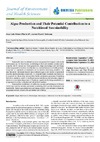Identificador persistente para citar o vincular este elemento:
https://accedacris.ulpgc.es/jspui/handle/10553/70936
| Título: | Algae Production and Their Potential Contribution to a Nutritional Sustainability | Autores/as: | Gómez Pinchetti, Juan Luis Martel Quintana, Antera |
Clasificación UNESCO: | 241707 Algología (ficología) | Palabras clave: | Algae Sustainable diets |
Fecha de publicación: | 2016 | Publicación seriada: | Journal of Environmental Health Science and Engineering | Resumen: | Sustainable diets are defined as those that present low impacts both on the environment and the biodiversity, contributing to food and nutrition security and to a healthy life for present and future generations. Algae (macroalgae and microalgae, including cyanobacteria) have recently taken an increased interest as valuable products, being used as ingredients or condiments in the modern diversifying occidental cuisine. Moreover, nutritional research has confirmed algae as rich sources of potentially valuable, health-promoting compounds in a scenario where consumers are increasingly aware of the relationship between diet, health and disease prevention. Combining both ideas, nutritional needs vs. health promotion and disease risk reduction, algae are shown as a very interesting source of functional ingredients for being considered as a component of our day-to-day diet and related food products. Sustainability contribution of cultivation systems and techniques to biomass increasing in quality, security and control, so reducing effects on the environment and biodiversity, makes algae production a promising activity to be included in future developments toward a responsible and healthy way of living. | URI: | https://accedacris.ulpgc.es/handle/10553/70936 | ISSN: | 2378-6841 | DOI: | 10.15436/2378-6841.16.1101 | Fuente: | Journal of Environmental Health Science and Engineering [ISSN 2378-6841], vol. 2(3), p. 1-3 |
| Colección: | Artículos |
Los elementos en ULPGC accedaCRIS están protegidos por derechos de autor con todos los derechos reservados, a menos que se indique lo contrario.
